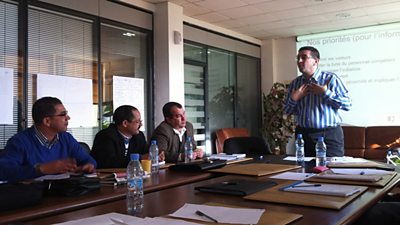Downloads
Publication date: April 2013
Summary
- As part of the British Foreign and Commonwealth Office's Arab Media Partnership project, �鶹�� Media Action is working with Radio Algeria to support its transition to public service broadcasting.
- A solid foundation for change has been developed, according to research findings from the final stages of the project. Research findings also show that there is a commitment to continued progress towards a full transition to public service broadcasting.
- These are positive results, and it is hoped that any work in the near future will produce increasingly tangible and measureable outcomes, building on the commitment to change and initial training success of this one-year project.
Context
In April 2011, during the Arab spring, President Abdelaziz Bouteflika pledged to open up the broadcasting market to private operators as part of a reform programme. This has led to an increased need to ensure that Radio Algeria produces public service programming that is relevant to its audiences and starts to build the skills, structures and systems needed to fulfil its potential to function as a public service broadcaster. Within this context, �鶹�� Media Action spent 11 months conducting a targeted training and development programme to support Radio Algeria in initiating the transition process.
The project
The project provided a range of training, development and mentoring activities delivered by international trainers who used a range of techniques including individual on-the-job support, small group work, large group consultations, online learning, and developing in-house training capacity. Activities were targeted at managers, editors and journalists from all stations within Radio Algeria and focused on creating momentum for and engagement in change across the organisation.
Research methodology
This was a mixed method research and evaluation project designed to assess the impact of �鶹�� Media Action’s support for Radio Algeria’s transition into a Public Service Broadcaster, and to demonstrate the commitment of the management to continued change and development. Research methods included: trainee feedback forms (a total of 212 forms, collected throughout the project), trainer reports (a total of 29 narrative and 19 additional research reports), in-depth interviews (with nine attendees at the project’s closing conference in March 2013) and a survey (a total of 54 questionnaires completed at the closing conference in March 2013).
Findings
Media practitioners in Algeria have a good understanding of what is required of a public service broadcaster, and are positive that a number of indicative standards such as a diversity of programmes, diversity of subjects discussed and diversity of audiences are already met in their country. However, as may be expected at this early stage in transition, practitioners identified that the independence of Algerian radio is not yet of a public service broadcasting standard. When asked about the major challenges facing public service broadcasting in Algeria, practitioners most commonly mentioned difficulties relating to limitations of skills, knowledge and resources within the organisation.
The research found a commitment to change at all levels. One senior manager reported that “the journalists and media practitioners are aware all the time, at every moment, of the necessity of progress… and of obstacles that they have to overcome for the improvement of the radio”, while another confirmed that “everything that we learned must gradually be put into practice”. As with any transition though, there was some frustration expressed at the length of time that it is taking to make changes, as one practitioner explained: “all changes take time… it takes probably years to implement a new view of public services... that can face the new challenges in this new era… so it takes years, that’s for sure”.
Feedback from the �鶹�� Media Action training courses was very positive overall. At the stage immediately after training, the majority of respondents reported that they would implement the new skills that they had learned following the training, including expertise in editing news, structuring interview questions, and preparing reports. Feedback was positive from practitioners at all levels and in all departments, who said when questioned that participating in training throughout the project had increased their capacity. However, there was also an acknowledgement of the limitations of the impact of increased capacity when it only applies to certain elements of a team; as one interviewee explained: “there is a very big problem… when we do the training we find that other people didn’t do the training and don't know the information, so there is opposition or resistance to the implementation”.
Implications
The findings of the research carried out in the project's final stages project point to the development of solid foundations for change, as well as a commitment to continued progress towards a full transition to public service broadcasting. These are positive results, and it is hoped that projects pursued in the near future will produce increasingly tangible and measureable outcomes in the development of Radio Algeria’s transition to public service broadcasting.
